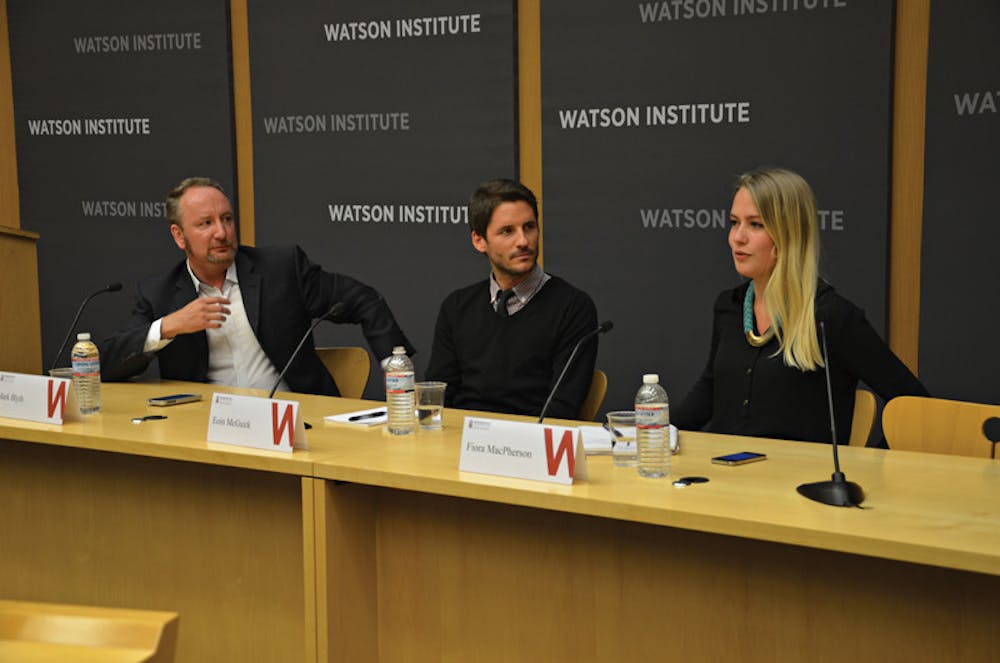Referencing the French economist and author of “Capital in the Twenty-First Century” at a forum Monday on the Scottish independence vote, Mark Blyth, professor of international political economy, described the campaign for independence as the world’s first “Pikettyesque referendum.”
The themes of economic inequality, self-representation and the diverse interpretations of a nation’s social contract continued throughout the discussion, as a panel — consisting of Blyth, Fiora MacPherson ’16 and Eoin McGuirk, a postdoctoral fellow in economics at the Watson Institute for International Studies — explored the origins and consequences of the Scottish independence referendum.
The referendum, which would have made Scotland an independent and sovereign nation, failed last Thursday, with about 55 percent of people voting against it.
“I emailed Mark about screening the results of the referendum in Buxton, and he suggested being part of this talk,” MacPherson told The Herald. “And up until Thursday none of us knew which way the vote would go.”
Blyth, who is from Scotland, began the discussion by sharing his initial uncertainty over the referendum, citing his long residence in the United States as a cause for some ambivalence. Despite the “economic costs of disunion,” Blyth said he did not believe that the “yes” campaign was caused by “parochialism, Presbyterianism and capitalism,” as he had initially thought.
“It’s beyond nationalism in the traditional sense,” he said, after dismissing nationalism as “drawing-room fascism” in a quote drawn from playwright George Bernard Shaw. “Instead, it’s a group of younger people trying to imagine a very different future” from the political status quo, Blyth added.
Citing widespread disillusionment with the New Labour policies of former U.K. Prime Minister Tony Blair and general distrust of the Conservatives, particularly after the 2008 financial collapse, Blyth conceptualized the campaign for an independent Scotland as a “social movement” to fundamentally change the political order in the United Kingdom.
Despite his support for the social causes behind the campaign, Blyth identified himself as being against disunion because of the immediate and tangible consequences of a yes vote.
“Voting against the Union would be like stabbing the Liberal Democrats of England in the heart and leaving them to the Tories,” Blyth said, imagining the political reality in England, which is generally conservative, without the balancing power of the more liberal Scotland. “We would be creating a ‘teenage sovereignty’ in Scotland” where England would still provide the infrastructure, currency and financial system for the nation without gaining anything in return, he argued.
MacPherson, a native of Scotland, spoke in favor of Scottish independence, based on her personal experience in the country and the massive rates of unemployment and poverty in the region due to “Westminster policies” from out-of-touch “Etonians.”
“My mother taught me to memorize the Declaration of Arbroath” as a child, MacPherson said, referencing the 1320 declaration of Scottish independence. “But despite this 700-year history, only in the last few weeks has England begun to make concessions for Scottish autonomy.”
In particular, MacPherson emphasized the generational aspect of the movement, and the large youth support for devolution.
“Seventy-one percent of young people voted for independence,” she said, “because they feel systemically excluded from the political discourse. It’s about representation more than independence.”
McGuirk, who is Irish, tried to provide an objective and dispassionate analysis of the referendum, examining the tensions and tradeoffs of secession and independence from an economic perspective.
“Bigger is better” for countries, he said. “As more people contribute to public goods like health care or infrastructure, the goods themselves grow without diminishing in utility. But the bigger a country is, the more diverse it becomes and the more difficult it is to determine how to use public goods, which leads to underprovision.”
McGuirk further explored the consequences of institutional separation from a positive vote.
“Scotland’s GDP per capita is 15 percent higher than the average for the U.K.,” he said, “so they would theoretically be fine on their own. But it becomes trickier on how they would share national debt or a currency with England.”
The queries in a follow-up question-and-answer session — several of which came from Scottish students and nearby residents — centered on the future of the movement, the role of Scotland in the European Union and the referendum’s effects on other secessionist movements, such as that in Catalonia.
All the panelists were optimistic about the future of Scottish independence, suggesting that even if “Westminster” does nothing, the area will not forget the precedent of this referendum in future negotiations.
Theo Follini-Press ’17, who is British, told The Herald afterward that he enjoyed the event, but noted “the difficulty of the situation if the vote had been either yes or no,” adding that people are “nowhere near an answer to that.”

ADVERTISEMENT




